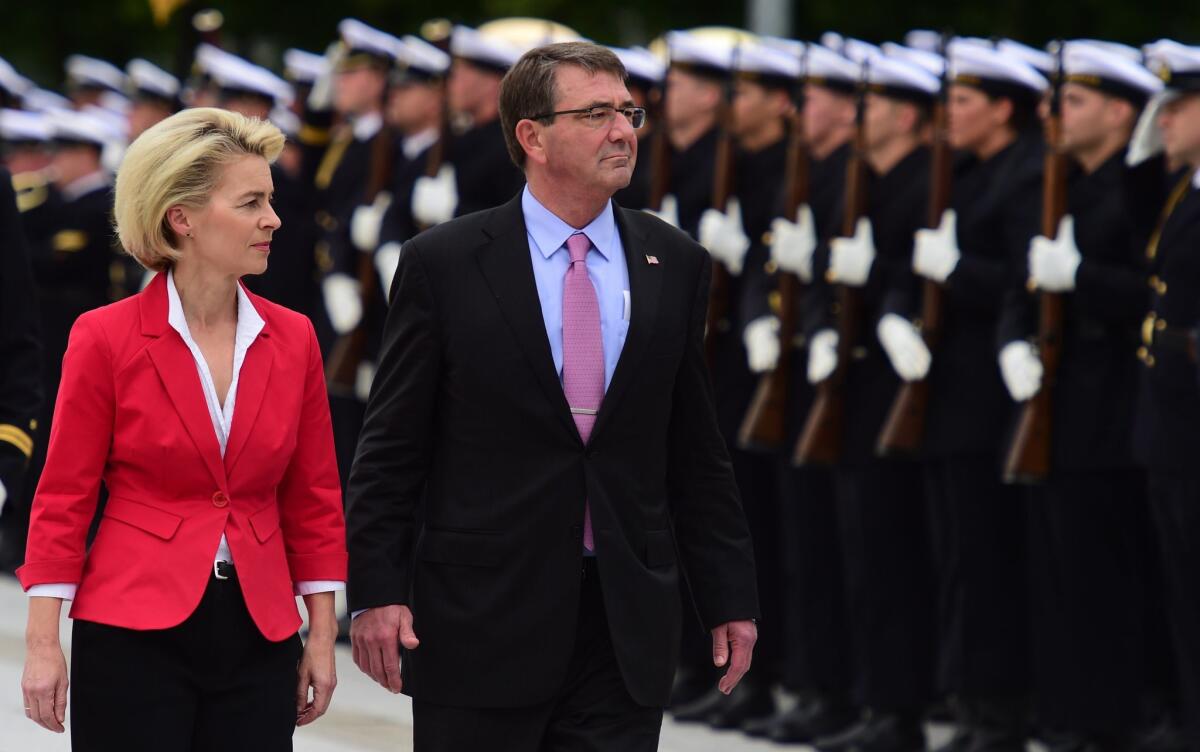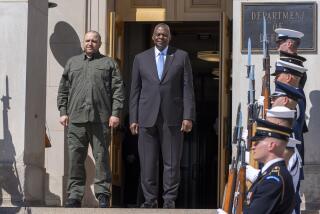U.S. pledges commandos and high-end equipment for new NATO force

German Defense Minister Ursula von der Leyen and U.S. Defense Secretary Ashton Carter review an honor guard during an official welcoming ceremony in Berlin on Monday. Carter is on a weeklong trip to NATO countries.
- Share via
The United States will contribute special operations forces and high-end military equipment and weapons to the new NATO rapid-reaction force being assembled to protect Eastern European allies from Russian threats and the entire continent from Middle East terrorism, Defense Secretary Ashton Carter announced Monday.
At the start of his weeklong trip through member states of the North Atlantic Treaty Organization, Carter said that U.S. commitment to the stepped-up collective defense efforts reflects a new NATO strategy for dealing with a security environment that has changed dramatically since the end of the Cold War.
The U.S. contribution to the new force, currently based in Germany but poised to arrive at any flashpoint within 72 hours, will include intelligence and surveillance capabilities, logistics, air transport, fighter aircraft, ship-based missiles and pre-positioned heavy equipment, Carter said. The Pentagon will also provide special forces commandos, but the bulk of the United States’ role will not involve boots on the ground, he noted.
Unlike during the Cold War, when NATO forces were deployed to guard against massive land invasions from the Soviet bloc, the alliance now faces its greatest challenges from the kind of “hybrid warfare” afflicting Ukraine and the threat of terrorism from violent extremist groups, such as Islamic State, Carter said.
The Pentagon chief identified President Vladimir Putin as the source of “concerning behavior by Russia,” and assured his audience of defense analysts at the Atlantic Bridge think tank in Berlin that the Western alliance has no desire to have a confrontational relationship with the Kremlin.
“We do not seek a cold, let alone a hot war with Russia. We do not seek to make Russia an enemy,” Carter said. “But make no mistake: We will defend our allies, the rules-based international order, and the positive future it affords us all.”
Carter said the United States and its allies hope for a Kremlin leadership that “will once again try to move forward as a respected and strong but rule-abiding member of the international community.” In the meantime, NATO needs to be prepared to react to any security threat in the region, Carter said.
Also on Monday, the European Union formally extended sanctions imposed on Russia a year ago to run through January 2016, citing the failure of a Feb. 12 agreement in which Moscow pledged to use its influence with the separatists to end the war in Ukraine.
The Russian Foreign Ministry issued a statement accusing the European alliance of caving in to “the Russophobic lobby” by extending the sanctions, a comment likely aimed at Washington. The statement said the action “looks particularly cynical,” as it coincided with Monday’s anniversary of the 1941 invasion of the Soviet Union by Nazi Germany.
A Russian lawmaker in charge of security affairs in the State Duma, Irina Yarovaya of Putin’s United Russia party, cited Carter’s remarks about the Kremlin leader during weekend speeches as evidence of the “U.S. striving for external control and dominance” of Eastern Europe.
NATO’s gradually unfolding plans for strengthening defenses of Eastern Europe have antagonized the Kremlin, with Putin last week warning that Russia will deploy at least 40 more nuclear-armed intercontinental ballistic missiles this year in response to what it sees as Western aggression. Putin has repeatedly reminded the U.S. and other Western states that Russia possesses a powerful nuclear arsenal and intends to defend itself at any cost.
Carter responded to Putin’s verbal threats in telling reporters covering his European trip on Sunday that “nuclear weapons are not something that should be the subject of loose rhetoric by world leadership.”
“We all understand the gravity of nuclear dangers. We all understand that Russia is a long-established nuclear power. There’s no need for Vladimir Putin to make that point,” Carter said, according to a Pentagon transcript.
NATO decided to create the awkwardly named Very High Readiness Joint Task Force to have thousands of troops, equipment, arms and transport available to deploy in the event of an overt attack on a member nation, as well as deter the creep of clandestine interference of the type destabilizing Ukraine.
More than 6,400 people, many of them civilians, have been killed since pro-Russia separatists began occupying eastern Ukraine’s Donetsk and Luhansk regions 14 months ago.
Although Putin and other Kremlin officials deny Russian troops are involved in the fighting in Ukraine, captured paratroopers and NATO satellite surveillance suggest otherwise.
Carter will travel next to Estonia, one of the former Soviet republics on the Baltic Sea that has been rattled by Putin’s claimed right to a traditional “sphere of influence.”
Follow @cjwilliamslat for the latest international news 24/7
More to Read
Sign up for Essential California
The most important California stories and recommendations in your inbox every morning.
You may occasionally receive promotional content from the Los Angeles Times.









